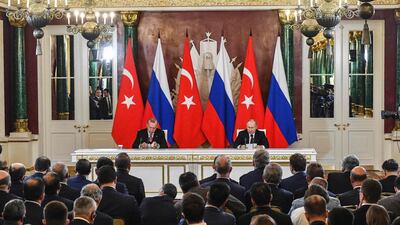A member of Russia’s lower house of parliament, Sergei Neverov, has called on lawmakers in Iran and Turkey to coordinate with Moscow to help millions of displaced Syrians return home.
Mr Neverov, deputy chairman of the State Duma aligned with the ruling United Russia party, proposed that lawmakers from Turkey and Iran who are responsible for international affairs should hold a joint conference to help facilitate the return of Syrian refugees displaced by the eight-year conflict.
“I am confident that in the framework of parliamentary diplomacy, we can significantly move forward in solving this serious humanitarian problem affecting the fate of hundreds of thousands of innocent people who are forced to endure hardship and suffering,” Mr Neverov said during a meeting in Moscow with the foreign affairs committees of the parliaments of Turkey and Iran.
In July 2018, Russia launched an initiative to repatriate the 5.6 million people who have fled Syria since 2011. Officials in Lebanon, which is hosting more than 1 million Syrian refugees, welcomed the initiative, but have told The National last year that the plans have stalled over a lack of funding.
Yury Vidakas, Russia's Charge D'affaires in the UAE, told The National that the move was part of his country's "practical" approach to the two biggest issues that Moscow sees in the Middle East – regional security and displaced Syrian refugees.
“Once again, this is a different level of our collaboration because we are concerned about the Syrian refugees,” he said pointing out that there were already military and senior diplomatic discussions on such topics.
“Our policy is a constant one, Syrian refugees and regional security are of primary concern and [if it’s] parliamentary [delegations] or any other instrument but if you make things slightly better and minimize the negatives on the situation then it will be great and it will contribute to peace and the safe return to their country.”
As the war in Syria slowly grinds to a halt, Russia has lobbied Western governments to deliver vital funding to facilitate the return of Syrians from Lebanon, Jordan and Turkey. But EU and US officials and humanitarian groups have been reluctant to greenlight further funds over concerns of ongoing fighting in the country and a lack of reforms within the Syrian government.
Mr Vidakas said there is concern in Moscow about Western reluctance to back the return of refugees to Syria and added that “we have to reconstruct Syria and whether you like [President Bashar Al] Assad or no, ok… but the people are suffering and this is one of the ways that we are suggesting.
On Tuesday, Russia's UN Ambassador Vasily Nebenzya said during a meeting on refugees at the UN Security Council that more than 177,000 Syrians had returned since the Russian initiative was launched. However, some Russia analysts have expressed scepticism over figures cited by Russian officials.
The trilateral meetings in Moscow on Wednesday are part of a new format between Russia, Iran and Turkey, which will see the parliamentarians gather later in Ankara and Tehran.
The leaders of Iran, Turkey and Russia met together in the Black Sea resort city of Sochi in southern Russia on Valentine’s Day this year to negotiate a resolution to the eight-year conflict in Syria.
Russia, a staunch backer of the Syrian regime, is eager to launch a final offensive on the last stronghold of opposition to President Bashar Assad. However, Turkish President Tayyip Erdogan is worried that an assault on Idlib would result in some 3 million residents of the province flooding over the border to southern Turkey, exacerbating a refugee crisis there.

